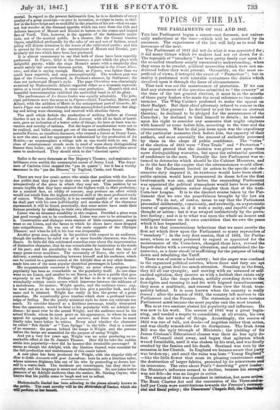THE THEATRES.
The classical opera is now in the ascendant at Covent Garden. Verdi and Donizetti have given place to Mozart and Rossini; and the theatre, to all appearance, profits by the change. Le Nozze di Figaro has been three times performed to overflowing and highly gratified audiences; and La Gazza Ladra, brought out on Thursday, drew an equally crowded house, and was received with similar demonstrations of pleasure. It may be worth while, perhaps, to explain the sense in which we use the word "clas- sical " as applied to opera, because the word is often very loosely and vaguely employed. A classical opera is a work of genius, constructed upon sound principles of art, which has stood the test of time long enough to show that it has obtained permanent favour, resting on solid grounds of taste, and not on the caprice or fashion of. the day. That the operas of Mozart would become classics was never doubted from the moment of their birth; but this, at first, was far from being the case with those of Rossini. Everybody admitted their brilliancy, and yielded to their irresistible attraction ; but it was common to deny their pretensions to classical character, and to contrast them, in this respect, with the more severe works of Mozart. Time, however, has wrought a ehange in the judgment of the really musical part of the public: Rossini is drawing nearer and nearer to Mozart, while he is nearly as much neglected for the sake of modern fashionable favourites. But may not this process continue—may not Donizetti, and even Verdi, so much decried at present, also have the benefit of time, and become classics in their turn? The question is obvious enough, but every musician will at once answer it in the negative. Though we name these composers together, we do not hold them equal, Donizetti being by many degrees Verdi's superior. But neither of them possesses the genius, the originality, the exquisite sense of the beautiful, the artistic ingenuity and skill, which enabled Rossini to "enchant the world" by a series of works which will make his name ion-
mortal. In regard to the present fashionable lion, he is so destitute of every quality of a great musician—so poor in invention, so vulgar in taste, so shal- low in the knowledge and so unskilful in the practice of his art—that we can- not but wonder at the diseased appetite which can turn from the rich and delicate banquet of Mozart and Rossini to batten on the coarse and insipid fare of Verdi. This, however, is the appetite of the fashionable multi- tude, not of the musical public. In a theatre, like the Covent Garden Opera, established professedly for the sake of art and not of fashion, sound policy will dictate attention to the wants of the cultivated public: and this is proved by the success of the masterpieces of Mozart and Rossini, par- ticularly the two which have been last produced.
• It is almost unnecessary to say that both of them have been superbly performed. In Figaro, Grisi is the Susanna; a part which she plays with delightful gayety, while she sings Mozart's music with a simplicity that would satisfy the severest German purist. Tamburini is the Count Alma- viva; and that is saying enough. Marini, as Figaro, was lighter than we could have expected, and saw..' unexceptionably. The weakest part was that of the Countess, performed, in Persiani's absence, by Steffanoni: she does not understand Mozart's style. The page Cherubino was charmingly sustained by Mademoiselle Alboui: regarded either as a dramatic represen- tation or a vocal performance, it came near perfection. Mozart's rich and beautiful instrumentation exhibited the unrivalled band in all its glory.
The performance of La Gazza Ladra was equally admirable. The prin- cipal performers were the same as in Figaro—Grisi, Tamburini, Marini, and Alboni, with the addition of Mario in the unimportant part of Gianetto. Al- boni's Pippo was another triumph to that accomplished performer: her sing- ing and acting were charming, and received with absolute furore.
The spell which forbids the production of striking ballets at Covent Garden is not to be dissolved. Mason Lescaut, with all its fault of heavi- ness, gave an indication of a better order of things; for here at least was in- vention and novelty of tableau. But the hopes of amelioration were not to be realized, and ballet cannot get out of the most ordinary forms. Made- moiselle Fuoco, an excellent dauseuse, who created a furore at Drury Lane, ii now the star; and her appearance solemnized by the production of Ls; i Rosiere,—as commonplace a village tale as one would wish to see. No class of entertainment stands more in need of some sharp distinguishing feature than ballet; and this is what the Covent Garden authorities never seem to understand. They should stick to the "classical opera."



























 Previous page
Previous page